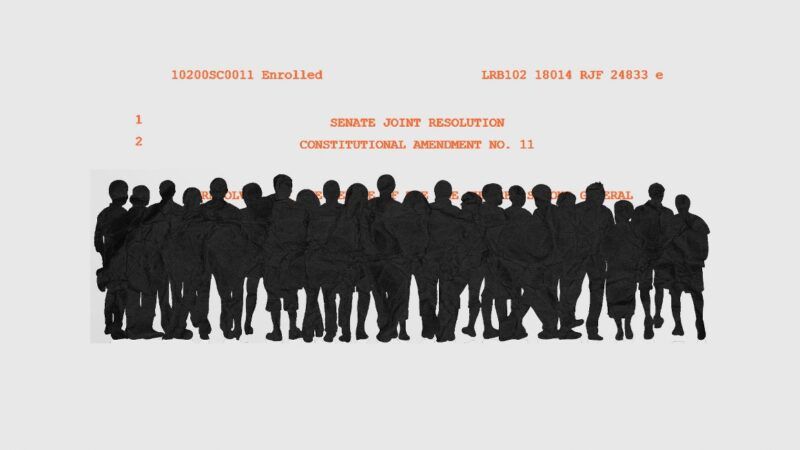Will Illinois Give Government Worker Unions a Constitutional Right To Overrule Laws They Don't Like?
Taking the "public" out of public service

Illinois voters next year will consider a constitutional amendment being presented as a guarantee of the right to unionize. But the proposal takes matters much further that that: It would allow collective bargaining agreements to supersede state laws, setting a dangerous precedent.
In May, Illinois lawmakers approved Senate Joint Resolution Constitutional Amendment 11. In order to take effect, voters will also have to approve a ballot referendum on it in November 2022. The goal, as stated by the measure's sponsor, state Rep. Mark Evans (D–Chicago), is to "stand up for workers' rights" by forbidding Illinois from becoming a right-to-work state. The amendment would prohibit Illinois lawmakers from passing legislation restricting public and private employee bargaining, and that includes agreements that could mandate union membership as a condition of employment.
This part of the amendment would put Illinois at odds with many neighboring states, where right-to-work laws forbid arrangements in which a person must join a union to hold a job. But Constitutional Amendment 11 goes much further than that: It bars any law that "interferes with, negates, or diminishes the right of employees to organize and bargain collectively over their wages, hours, and other terms and conditions of employment and workplace safety."
This seemingly innocuous collection of conditions will have some serious repercussions when it comes to reining in misconduct by unionized public sector employees. Any law that regulates the behavior of Illinois police officers, schoolteachers, or trash collectors could be upended by a union contract.
Disciplinary procedures for public sector employees are already heavily manipulated via collective bargaining agreements, which is why it's so hard to get rid of bad teachers and cops. Still, a law could flat out order the termination or forbid the hiring of public employees who engage in certain behaviors. Yet under this amendment, that law would be subject to veto by collective bargaining. Background checks? Officer certification and decertification? Bans on police chokeholds? All could be subjected to review on the basis of it being a "condition of employment."
As things stand now in Illinois, the Illinois Public Labor Relations Act already gives collective bargaining agreements with public sector units the power to overrule other state laws. But that is a statutory regulation that could be altered by lawmakers should they choose to do so. And sometimes judges determine that a "public policy exception" supersedes union collective-bargaining agreements.
Evans' proposal would put this wording into the state's Constitution. It would essentially become a recognized right for public employee unions to overrule state laws, making it even stronger than existing law and much harder to adjust.
The broadness of this amendment isn't getting much attention yet. But Joe Tabor, an analyst at the Illinois Policy Institute, is already putting out warnings:
This amendment would put union contracts above laws passed by the democratically elected representatives of the people of Illinois and could prevent limits on the subjects of collective bargaining for public employees. For example, the General Assembly could pass a law mandating a certain level of background check for school bus drivers, or disciplinary procedures for teacher misconduct. Given that unions could challenge such laws as violating workers' constitutional right to bargain collectively over such terms and conditions of employment, the amendment could potentially prevent such statutes from taking effect. It could also undo any measures that would rein in public school teachers' right to strike.
Consider the fights we're having right now over the guidelines to return to normal public schooling amid the COVID-19 pandemic. Under this law, whatever the voters or their elected representatives might think is the right approach would be less important than whatever the unions might demand in order for teachers to return to in-person work. Constitutional Amendment 11 takes the public out of the ostensibly democratic process of governing how Illinois government employees behave.
Maybe that's why the Chicago Teachers Union is so intent on attacking school choice. Why would parents send their kids to a school system knowing that they have no power, under the state's own constitution, to hold educators responsible for their behavior or for quality of service? No wonder enrollment is plummeting.


Show Comments (52)